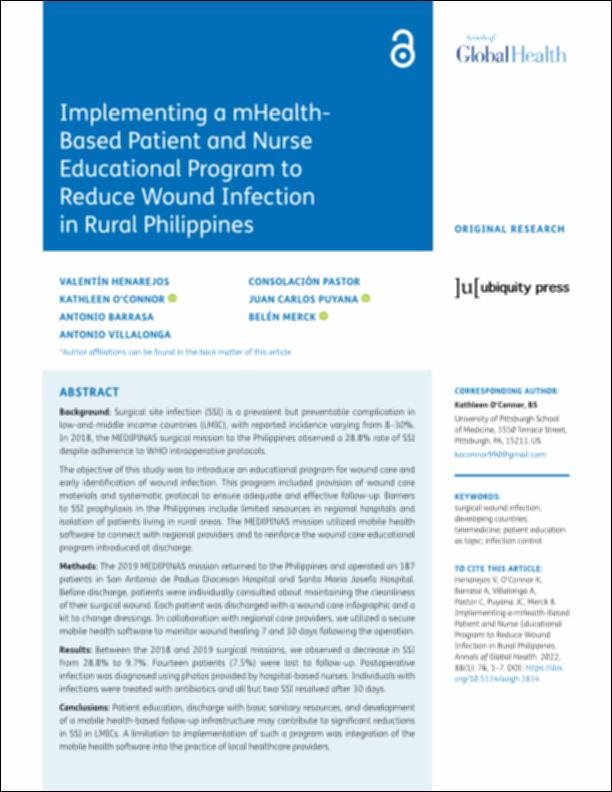Por favor, use este identificador para citar o enlazar este ítem:
http://hdl.handle.net/10637/14308Implementing a mHealth-based patient and nurse educational program to reduce wound infection in rural Philippines
| Título : | Implementing a mHealth-based patient and nurse educational program to reduce wound infection in rural Philippines |
| Autor : | Henarejos, Valentín O'Connor, Kathleen Barrasa Shaw, Antonio Rafael Villalonga, Antonio Pastor, Consolación Puyana, Juan Carlos Merck Navarro, Belén |
| Materias: | Wounds and injuries - Infections.; Telemedicina.; Telecommunication in medicine.; Educación sanitaria.; Health education.; Heridas - Infecciones. |
| Editorial : | Ubiquity. |
| Citación : | Henarejos, V., O'Connor, K., Barrasa, A., Villalonga, A., Pastor, C., Puyana, J. C. & Merck, B. (2022). Implementing a mHealth-based patient and nurse educational program to reduce wound infection in rural Philippines. Annals of Global Health, vol. 88, i. 1 (29 aug.), art. 76. DOI: https://doi.org/10.5334/aogh.3834 |
| Resumen : | Background: Surgical site infection (SSI) is a prevalent but preventable complication in low-and-middle income countries (LMIC), with reported incidence varying from 8–30%. In 2018, the MEDIPINAS surgical mission to the Philippines observed a 28.8% rate of SSI despite adherence to WHO intraoperative protocols. The objective of this study was to introduce an educational program for wound care and early identification of wound infection. This program included provision of wound care materials and systematic protocol to ensure adequate and effective follow-up. Barriers to SSI prophylaxis in the Philippines include limited resources in regional hospitals and isolation of patients living in rural areas. The MEDIPINAS mission utilized mobile health software to connect with regional providers and to reinforce the wound care educational program introduced at discharge. Methods: The 2019 MEDIPINAS mission returned to the Philippines and operated on 187 patients in San Antonio de Padua Diocesan Hospital and Santa Maria Josefa Hospital. Before discharge, patients were individually consulted about maintaining the cleanliness of their surgical wound. Each patient was discharged with a wound care infographic and a kit to change dressings. In collaboration with regional care providers, we utilized a secure mobile health software to monitor wound healing 7 and 30 days following the operation. Results: Between the 2018 and 2019 surgical missions, we observed a decrease in SSI from 28.8% to 9.7%. Fourteen patients (7.5%) were lost to follow-up. Postoperative infection was diagnosed using photos provided by hospital-based nurses. Individuals with infections were treated with antibiotics and all but two SSI resolved after 30 days. Conclusions: Patient education, discharge with basic sanitary resources, and development of a mobile health-based follow-up infrastructure may contribute to significant reductions in SSI in LMICs. A limitation to implementation of such a program was integration of the mobile health software into the practice of local healthcare providers. |
| Descripción : | Este artículo se encuentra disponible en la siguiente URL: https://annalsofglobalhealth.org/articles/10.5334/aogh.3834 |
| URI : | http://hdl.handle.net/10637/14308 |
| Derechos: | http://creativecommons.org/licenses/by/4.0/deed.es |
| ISSN : | 2214-9996 (Electrónico) |
| Idioma: | es |
| Fecha de publicación : | 29-ago-2022 |
| Centro : | Universidad Cardenal Herrera-CEU |
| Aparece en las colecciones: | Dpto. Medicina y Cirugía |
Los ítems de DSpace están protegidos por copyright, con todos los derechos reservados, a menos que se indique lo contrario.


